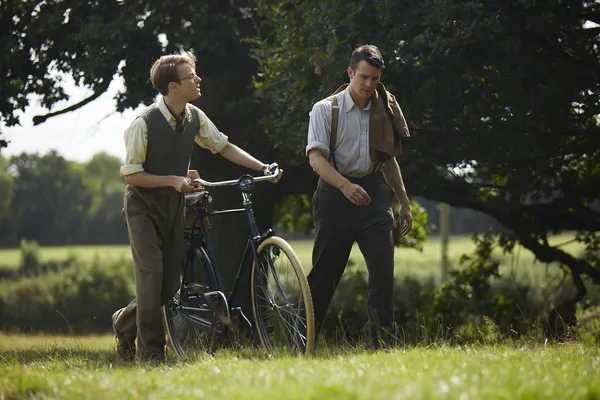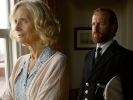Eye For Film >> Movies >> Making Noise Quietly (2019) Film Review
Making Noise Quietly
Reviewed by: Amber Wilkinson

The shadow of various wars becomes the battleground for conflict on the homefront in Dominic Dromgoole's retelling of Robert Holman's play, adapted by the playwright alongside Nick Drake and Mark Rosenblatt. It's a triptych of tales spanning the decades from the Forties through to the Nineties and, visually at least, Dromgoole has some success in opening them out to the film format - connecting them via a lilting score from Stephen Warbeck - even if you can still detect the creak of the theatre boards and the dust of backstage in the dialogue.
First we travel back to the sun-kissed Kent of 1944 - you can almost hear the crack of leather on willow, except for the fact, of course, that men of cricket-playing age have gone for war - save for Oliver (Luke Thompson) and Eric (Matthew Tennyson) that is. The pair have very different reasons for still being in the Garden of England that we discover over the film's gentle first half hour as a tide of subtle emotions ebbs and flows.

The film hardens by degrees, so that next, in its shortest segment, we're transported to a living room in Redcar. It's 1982, but you sense that time has largely stood still in post-war Britain. Here, May (Barbara Marten giving the sort of magnetic performance that deserves the Alan Bennett treatment) is waiting for her grandkids to come. Instead, a man in uniform (Geoffrey Streatfeild) arrives with the worst sort of news from the Falklands. The wistful longings and regrets of the film's first portion solidify into something more brittle and dangerous here, as May recalls her relationship with her son, although things stay buttoned-up British to the last.
Finally, there are more open outbursts of negative emotion in the third segment, which takes place in Germany's Black Forest of 1996. Helene (Deborah Findlay, giving the second of this film's outstanding female performances) is enjoying the solitude of painting in the woods when a small frightened boy suddenly runs down an embankment, closely followed by a man shouting his apologies. It emerges that they are ex-squaddie Alan (Trystan Gravelle, who ought to be getting more in terms of film roles) and his stepson Sam (Orton O'Brien) and that their relationship is marked by violence. Helene, with her quiet manner and own history of conflict, proves a catalyst for a shift in their relationship.
The scripting is spare throughout to the point of threadbare in places. What works on a stage, when you can feed of the energy of the cast, needs more on film. We make allowances for the lack of conversational padding in the theatre but in the more naturalistic setting of cinema some of this is too hard and fast - especially in the final third. The short film nature of each segment adds to this feeling of curtailment, although when the emotions land they do so firmly and in unexpected ways.
Reviewed on: 19 Jul 2019

















